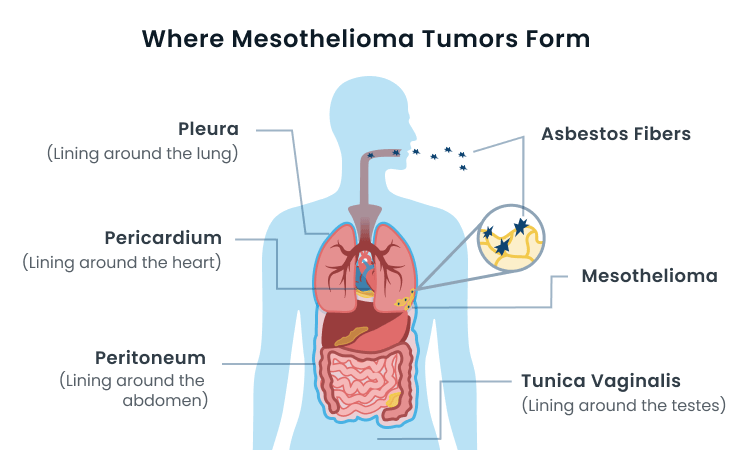Stage 3 Mesothelioma
Stage 3 mesothelioma is the most common stage of diagnosis. In stage 3, tumors have spread into tissues, organs or lymph nodes around the cancer’s original site. The prognosis for stage 3 mesothelioma is poor. Patients diagnosed with late-stage pleural mesothelioma have a median survival of 17.9 months in stage 3.
What Is Stage 3 Mesothelioma?
Stage 3 is an advanced stage of mesothelioma cancer. In this stage, pleural tumors have spread throughout the lining of the lungs on one side of the chest. This includes the centralized glands known as mediastinal lymph nodes.
Pleural stage 3 tumors can affect nearby structures such as the diaphragm and heart sac. They can also grow on the chest wall and central chest region between the lungs, known as the mediastinum.
Peritoneal cancer, which occurs in the abdomen, does not have an official staging system. But doctors use an established tool to help stage peritoneal mesothelioma. Using that system, peritoneal stage 3 tumors may spread to nearby lymph nodes or the peritoneal lining. Tumors in stage 3 have not yet spread to distant organs
Stage 3 Mesothelioma Facts
- The two-year survival rate for all stages of pleural mesothelioma combined is 22%. The five-year survival rate at stage 3 is about 16%.
- The two-year survival rate for all stages of peritoneal mesothelioma combined is 35%. The five-year survival rate at stage 3 is 29%.
- Tumor-removing surgery is still a possibility for certain cases.
- Symptoms include frequent chest pain, difficulty breathing, abdominal pain, bloating and digestive issues.
- Emerging treatments through clinical trials may extend survival.
Treatment options are more limited than in earlier mesothelioma stages. Surgery is possible but less likely to be successful. Disease progression worsens prognosis and survival.
There is no cure for this rare cancer. Researchers are working on new therapies to extend patients’ lives. Mesothelioma specialists can help patients find clinical trials and experimental treatments. These may improve survival rates and quality of life.
Stage 3 Mesothelioma Symptoms
Stage 3 mesothelioma symptoms may include shortness of breath, fever or fatigue. In stage 3, symptoms are more noticeable and intense than in stage 2 mesothelioma.
Because of the mesothelioma latency period, symptoms before stage 3 are rare. These symptoms can occur in any variant of mesothelioma.
The most common symptoms of stage 3 mesothelioma include:
- Shortness of breath
- Pain in the chest or abdomen
- Recurring dry cough
- Fatigue
- Fever
- Fluid buildup
- Weight loss
Stage 3 symptoms vary from patient to patient. As tumors grow and spread throughout the chest or abdomen, symptoms worsen. They can depend on where the cancer spreads and if the tumor mass damages vital organs. Pleural mesothelioma tumors cause increased pleural fluid, which puts pressure on the lungs. Peritoneal tumors cause peritoneal fluid buildup that places stress on the abdomen.
Symptoms and characteristics of stage 3 mesothelioma vary based on cancer type. Some patients may experience referred pain in the neck, back or shoulders. A tumor in the chest wall may cause chest pain. Tumors forming around the lung may lead to breathing difficulties.
Characteristics of Stage 3 Mesothelioma by Type
Characteristics of stage 3 mesothelioma include localized tumors and distant lymph nodes. Different staging systems use other features to define the respective stages.
The pleural form is the only one with an official staging system. The American Joint Committee on Cancer developed the TNM staging system. It was last updated for pleural mesothelioma in 2018. TNM measures the tumor spread (T), lymph node involvement (N) and level of metastasis (M).
In 2011, researchers suggested a TNM system for peritoneal mesothelioma. It uses the existing Peritoneal Cancer Index to measure tumors in the abdomen. This index helps doctors determine the stage of many other abdominal cancers. It isn’t used for mesothelioma because doctors need more data to confirm its accuracy.
Stage 3 symptoms are more severe than stage 2. Patients have fewer treatment options, and cancer has invaded nearby tissues and organs. Compared to stage 4, tumors have not yet metastasized to distant areas of the body. Many therapies, such as chemotherapy and radiation, can prevent metastasis and extend survival.
Stage 3 Pleural Mesothelioma
Stage 3 pleural mesothelioma characteristics include two substages.
In stage 3A, tumors have grown into nearby structures. These include the diaphragm and mediastinum on one side of the chest. Cancer has spread to nearby lymph nodes or layers of the chest wall and the heart sac (pericardium). Surgery to remove all visible tumor growth may still be an option.
Stage 3B includes two variations depending on the primary tumor and lymph nodes. Surgery may be an option for patients with less tumor spread. It is less helpful for the ribs, spine, mediastinum, opposite pleura, heart or abdomen. Chemotherapy often is the best treatment.
Stage 3 Peritoneal Mesothelioma
Peritoneal mesothelioma is the second-most common form of the disease. The unofficial TNM system for peritoneal mesothelioma relies on the Peritoneal Cancer Index.
The characteristics of this stage are:
- Tumors localized in the abdomen
- Spread to nearby lymph nodes
- Metastasis outside the abdomen
The PCI ranges from 0 to 39, measuring the spread of tumors across 13 different abdominal sectors. A score between 30 and 39 indicates stage 3 peritoneal mesothelioma.
Stage 3 Pericardial and Testicular Mesothelioma
Doctors and researchers do not define stage 3 pericardial or testicular mesothelioma. These cancers are too rare for an official staging system.
Only 1% to 2% of mesothelioma cases are pericardial. This cancer forms within the sac that protects the heart. Diagnosis before the late stages is unlikely. By diagnosis, metastasis will likely have occurred in the lungs or chest cavity.
Doctors check testicular mesothelioma tumors using staging guidelines for general testicular cancer. They may refer to stage 3 testicular mesothelioma as late-stage cancer. This describes the spread beyond the lining of the testes to other tissues, such as lymph nodes or bone.
Stage 3 Mesothelioma Life Expectancy and Prognosis
Life expectancy ranges from 16 to 26 months for stage 3 mesothelioma patients. It measures how long someone might live after their diagnosis.
A patient’s medical history, health and treatment history also affect life expectancy. Prognosis estimates how well a patient may respond to treatment. This also varies for each patient. Mesothelioma life expectancy and prognosis can improve after trying a new therapy.
Life expectancy for stage 3 mesothelioma patients also depends on lymph node involvement. Malignant tumors spread to lymph nodes where cancer cells enter the lymphatic system. This can create new tumors in distant parts of the body.
Some patients live for many years with successful treatment. Survival rates are not the only indicators of a mesothelioma patient’s prognosis.
Survival statistics do not apply to everyone and can’t predict a person’s prognosis. Age, gender, cancer cell type, response to treatment and general health affect survival. Surgery and post-surgery therapies may help patients live past their life expectancy.
Mesothelioma Stage 3 Survival Rates
About 16% of stage 3 pleural mesothelioma patients live five years after diagnosis. Roughly 29% of stage 3 peritoneal mesothelioma patients live at least five years.
Patients with late-stage testicular mesothelioma have a median survival of about two years. Late-stage pericardial mesothelioma patients have an average survival of about 10 months. Some live much longer after surgery or chemotherapy.
How Lymph Nodes Affect Cancer
Lymph nodes play a vital role in the spread of cancer. Lymph nodes help filter the blood. They block bacteria and viruses from spreading through the body. Cancer cells in lymph nodes can enter the bloodstream and spread into distant organs. After metastasis occurs, surgery is no longer helpful.
Early treatment can prevent metastasis and extend life expectancy. It is critical to remove cancerous growths before they spread to other body areas.
Patients with stage 3 mesothelioma may have varying degrees of lymph node involvement. Patients with more cancerous lymph nodes have a life expectancy of about 13 months. Those with minor lymph node involvement often live more than two years.
Surgery may not be an option for some stage 3B patients even if cancer has not spread to the lymph nodes. Patients with stage 3B may have tumors in the diaphragm or pericardium. In this case, surgery is not a viable option.
What to Do After a Stage 3 Mesothelioma Diagnosis
After receiving a stage 3 mesothelioma diagnosis, you should find a mesothelioma specialist. Seek treatment as soon as possible following a stage 3 mesothelioma diagnosis.
Working with experienced mesothelioma gives you the best chance of improving your prognosis. Improving health through nutrition and exercise may help extend your mesothelioma life expectancy.
Not all hospitals or major metropolitan cancer centers have doctors focusing on mesothelioma. Joining a mesothelioma support group is a great way to build a network of information. You can learn about clinical trials and physicians specializing in this rare cancer. These specialists understand the challenges patients face.
Mesothelioma support groups help patients come to terms with their diagnosis. They can provide resources for improving quality of life and mental health awareness.
How Is Stage 3 Mesothelioma Treated?
A multimodal treatment plan uses surgery, chemotherapy and radiation. It has produced the best survival rates for people with stage 3 pleural mesothelioma.
Stage 3 tumors are aggressive, but removal may be possible. Extensive surgery and aggressive cancer treatment provide benefits in specific circumstances.
Some stage 3 mesothelioma patients may not qualify for aggressive treatment. They may be eligible for immunotherapy, chemotherapy and palliative therapies that control symptoms. These patients may also apply for emerging treatments available through experimental clinical trials.
Surgery
Pleural mesothelioma patients at stage 3 may be eligible for extrapleural pneumonectomy surgery. This procedure removes the affected lung and pleural lining. It also removed the diaphragm and heart lining, known as the pericardium.
Some stage 3A mesothelioma patients may qualify for less aggressive surgery. The less extensive and more meticulous procedure is a pleurectomy and decortication. It removes the lung lining, pericardium and diaphragm. It also removes tumor masses growing inside the chest cavity, leaving the lung intact.
Chemotherapy
Chemotherapy is a standard therapy for stage 3 mesothelioma. It is available standalone or to enhance outcomes of surgery.
In general, mesothelioma surgeries have better survival rates when combined with chemotherapy. Most patients receive chemotherapy drugs in combination through an IV. Chemotherapy can begin as soon as a patient recovers from surgery. Doctors may also administer mesothelioma chemotherapy before or during surgery.
One chemotherapy technique attempts to shrink tumors before a patient’s operation. A 2020 medical report focused on a stage 3 mesothelioma patient. They responded well to chemotherapy and improved to stage 2. After surgery, the patient underwent another round of chemotherapy to prevent a recurrence.
Radiation Therapy
Radiation therapy is often used in multimodal therapy. After surgery, it can prevent local recurrence or regrowth. Not every stage 3 mesothelioma patient is eligible for radiation. For many patients, it has helped avoid tumor growth. Some research reports improved survival with radiation therapy before surgery to shrink tumors.
Palliative Care
Symptoms are more intense in stage 3. Palliative care options are essential so patients can improve their quality of life. Stage 3 patients who do not qualify for multimodal care may have palliative options. These can improve symptoms and may help patients live longer.
Doctors use palliative chemotherapy and radiation to lessen cancer-related pain and extend survival. Palliative surgery drains fluid buildup around the tumors. This helps with difficulty breathing or abdominal pain.
Immunotherapy and Clinical Trials
Immunotherapy and gene therapy are two evolving areas in cancer treatment. Clinical trials provide hope for stage 3 patients who don’t qualify for other treatments. The U.S. Food and Drug Administration in 2020 approved two mesothelioma immunotherapies. The combination includes Opdivo and Yervoy. Their generic names are nivolumab and ipilimumab.
Specialists at specific treatment centers offer mesothelioma clinical trials. These experimental treatments can improve prognosis and extend life expectancy. Patients should ask their mesothelioma specialists about appropriate clinical trials in their area.
Integrative Therapies for Mesothelioma
Complementary therapies include acupuncture, yoga and nutritional counseling. Patients may choose to integrate these with conventional stage 3 mesothelioma treatments. They may improve health, decrease symptoms or boost the immune system.
Some late-stage patients choose to forego conventional treatments for alternative therapies. In 2017, the Journal of the National Cancer Institute studied alternative medicine effects. They found that relying on alternative medicine led to a much lower survival rate.
Help Covering Treatment Expenses
Treatment for mesothelioma is costly. The average price of surgery is around $120,000. Monthly chemotherapy sessions can cost up to $12,000. Private insurance or Medicare won’t always cover all the costs. Financial help is essential for many mesothelioma patients.
Grants can help cover travel expenses to the top mesothelioma cancer centers. Financial aid may also be available through asbestos trust funds and legal claims. A qualified mesothelioma attorney can answer any questions and explain your compensation options.
 Lifeyet News Lifeyet News
Lifeyet News Lifeyet News





